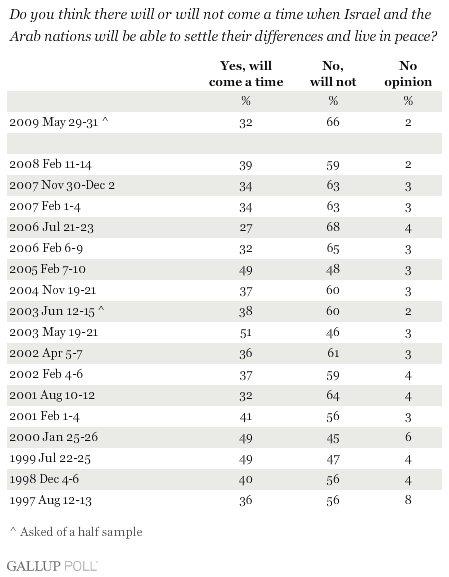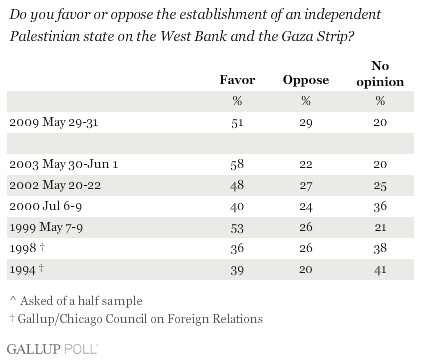PRINCETON, NJ -- With President Barack Obama seeking to engage the Arab world with his speech in Cairo, Americans' confidence that there will ever be peace in the Middle East is at near-record lows. Only 32% of U.S. adults surveyed by USA Today and Gallup in late May believe "there will come a time when Israel and the Arab nations will be able to settle their differences and live in peace"; 66% disagree.
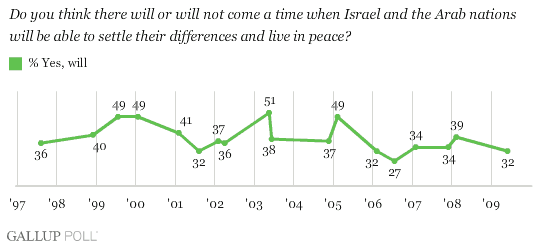
Current attitudes about the chances for Mideast peace are nearly the most negative that Gallup has found in more than a decade of polling on this question. The only time fewer Americans were optimistic about Arab-Israeli peace was in July 2006, when only 27% believed it could be achieved. This coincided with the Israeli-Hezbollah war in southern Lebanon, and followed the election victory of Hamas in the Palestinian Territories in January.
Americans' outlook for Mideast peace has since remained quite downbeat. However, as the long-term trend shows, public optimism about the conflict has varied, and has a history of rebounding from pessimistic lows -- particularly after U.S.-brokered peace talks in 1999, 2003, and 2005.
One thing that does not appear to be a factor, at least in terms of the recent trend, is politics. There has been little change over the past year -- spanning the change in presidential administrations from that of Republican George W. Bush to that of Democrat Obama -- in the outlook for peace among rank-and-file Republicans and among rank-and-file Democrats.
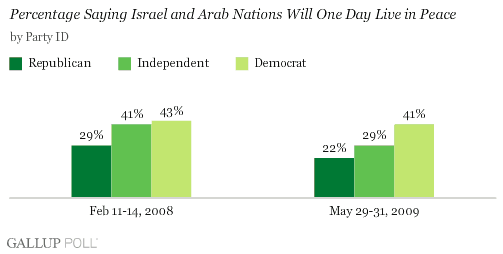
General Support for Palestinian Statehood
After the Cairo speech, the hard work for the Obama administration will be advancing its goal of a two-state solution to the Israeli-Palestinian conflict. While the establishment of an independent Palestinian state formed the basis for the "road map" to peace outlined in the 2003 peace accords, the newly elected prime minister of Israel, Benjamin Netanyahu, appears to be backing off from that goal, and Palestinian President Mahmoud Abbas recently indicated that he is not prepared to resume peace talks without a greater commitment to statehood from Israel.
Americans favor the establishment of an independent Palestinian state on the West Bank and Gaza Strip. Fifty-one percent in the new poll say they favor this; only 29% are opposed. An additional 20% have no views on the matter.
While support for Palestinian statehood is slightly lower today than what Gallup found in May 2003 (58%), it is higher than at any other time historically since Gallup first asked the question in 1994. Each time Gallup has asked it, more Americans have been in favor of a Palestinian state than opposed to it.
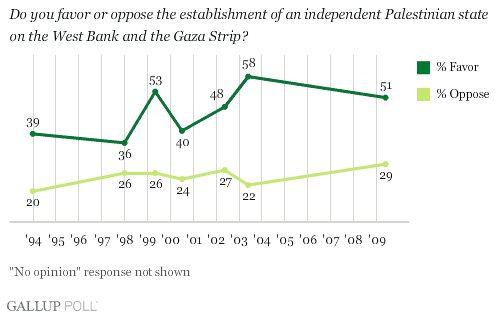
Politically, Democrats and political independents are much more supportive of Palestinian statehood than are Republicans. Republicans have typically more closely aligned themselves with the Israeli side of the conflict than have Democrats.
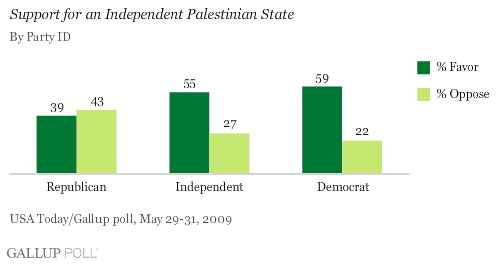
Egypt's U.S. Image
The Obama team reportedly navigated many complicated diplomatic issues in selecting Cairo as the site for Thursday's important speech. While considerable thought was put into the reaction the location would generate among Muslims, the American audience must have been factored in as well. In fact, Obama selected perhaps the most appealing Muslim venue possible for his speech, in terms of American attitudes toward different Muslim countries.
In Gallup's February World Affairs survey, 59% of Americans said they have a favorable view of Egypt. This was nearly as high as the percentage viewing Israel favorably (63%), placing it near the top-ranking countries measured in the 2009 survey. Egypt's ratings were much higher than those of other predominantly Muslim countries from the 2009 survey, including Saudi Arabia (31%), Iraq (28%), Afghanistan (19%), the Palestinian Authority (15%), and Iran (12%).
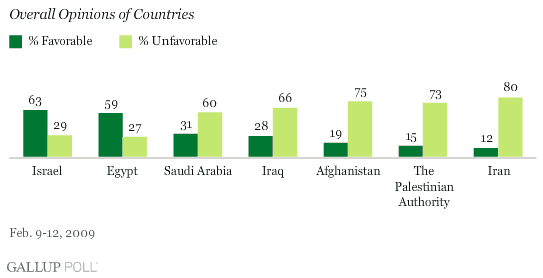
Gallup polling in February of previous years found a majority of Americans viewing Indonesia favorably (57% in 2005), as well as Turkey (53% in 2007) and Jordan (51% in 2007). However, much lower favorable scores were seen for Libya (22% in 2006) and Syria (21% in 2007).
Bottom Line
President Obama's speech in Cairo comes at a time when many Americans may think he has set some impossible foreign policy goals for his administration. Most Americans believe the Muslim world views the United States unfavorably, and thus, Americans may be skeptical that he can transform those attitudes. They also have also seen enough failures and setbacks in negotiations between Israel and the Palestinians over the past decade that they are, perhaps, jaded about the chances peace will ever come about. However, Americans generally support the two-state solution Obama will be advancing over the coming months, and they may feel encouraged by the image of an American president being welcomed in the heart of the Arab world, and in one of the few Arab or Muslim countries Americans largely admire.
More generally, a majority of Americans just prior to the speech said they approved of the job Obama is doing of handling the situation in the Middle East. This rating was taken after his recent White House meetings with Netanyahu and Abbas, in which he called on Israel to halt the construction of new settlements on the West Bank. The challenge for Obama will be maintaining public support for his efforts if Arab-Israeli peace proves elusive, or if he is perceived as being too tough on Israel -- a country Americans are generally sympathetic to in the Mideast conflict.
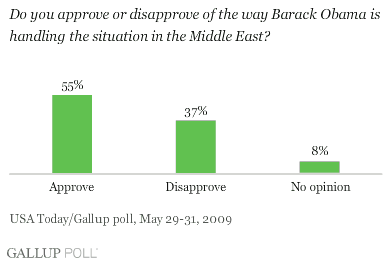
Survey Methods
The latest results are based on telephone interviews with 1,015 national adults, aged 18 and older, conducted May 29-31, 2009. For results based on the total sample of national adults, one can say with 95% confidence that the maximum margin of sampling error is ±3 percentage points.
Interviews are conducted with respondents on land-line telephones (for respondents with a land-line telephone) and cellular phones (for respondents who are cell-phone only).
In addition to sampling error, question wording and practical difficulties in conducting surveys can introduce error or bias into the findings of public opinion polls.
